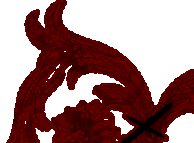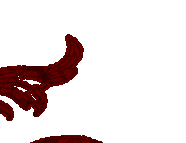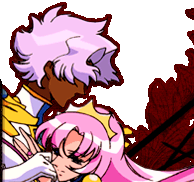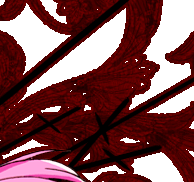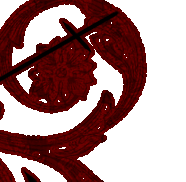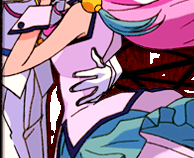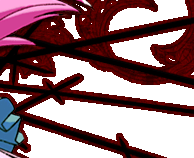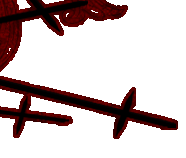
Evil has become
a source of enthrallment and titillation for the average seeker of
entertainment. In the safety of the movie theater, or in the comfort
of the couch in front of the TV, we can indulge the shadow of ourselves,
though we often pretend it's not there. Modern society takes evil
less seriously than cultures of old. Evil's often portrayed in a glamorous
light, and a villain can often be seen doing maleficent, offensive,
disturbing things in a way that makes them fashionable. In Die Hard,
Alan Rickman's character holds hostages, shoots people, and steals
money… all while spouting off decidedly cool one-liners. In Final
Fantasy VII, Sephiroth kills your healer character and does so in
a theatric presentation you can't help but admire him for. The examples
could go on for hours; any visit to the local movie theater, book
store, or game shop will find you ample evidence of this phenomenon
at work. Villains are made to be cool, amusing, intelligent, and more
often than not, sexy. The portrayal of evil and villainy as sexy in
modern entertainment is itself a subject that could fill tomes, so
I will avoid bringing non-Utena points to the table. Keep in mind, though,
that this isn't just an essay about Akio; points I make here would
apply to a vast array of modern pop culture entertainments, be they
film, television, book, or game. Men and women, unsurprisingly, don't handle evil the same way. Men allow for a certain degree of acceptance and nonchalance concerning attraction to evil women. This attitude comes from a perspective of sex that's altogether different from the female view of it. Men don't see themselves as allowing their mates control over them; though an evil woman might tear their throat out, men will still place themselves in the position of power in their fantasy. Those that genuinely wish to submit to a woman's authority are also usually honest about it, at least to themselves. (For obvious reasons, they don't go yelling that from a mountain.) For a submissive male, it simply makes more sense to be dominated by a villain; inner conflict regarding the morals of doing so is not unheard of, but it's rare.
Men also have little problem giving male villains their kudos for being cool. Considerably prevalent in the anime and gaming community I'm most familiar with, is a respect and admiration for villainy among men. They often see the villain doing what they've wanted to do, but don't because it's *wrong*. A guy playing a video game will live vicariously through the game's villain, and sympathizes and relates just as much to the enemy as he does the hero he's leading. And god forbid the character he controls is a deviant of some kind, allowing him to shoot people, run over pedestrians, and hire prostitutes. (I'm looking at you, Grand Theft Auto: Vice City.)
This all leads to the fact that typically men view evil (the inclination to do bad) as a part of them that simply exists. They deal with it by taking it out as best they can on targets that are socially acceptable. Namely, entertainment: movies, books, games, paint ball. Men view evil as something to be worked out of them.
Women, on the other hand, bottle up the desire to do bad, and deny the villains men so enthusiastically cheer on. It sounds like a gross generalization to say that women are less comfortable with their dark sides than men are, but there it is, and it's usually true. Ironically, women are very accepting of female villainy; they're jealous of the villain's lack of morality, and have a 'You go, girl!' attitude about it. It's no shock to anyone this is far from the male perspective. Men fantasize about doing evil things based chiefly on the standards of society. They can't kill, or they go to jail, so they read about a villain that kills and imagine it's them. Women are more concerned with their personal sense of morality. A woman's admiration of a female villain is based largely on how much fun she realizes she'd have if she had no morals, either. However women take male villains quite a bit differently. Smart, funny, or cool they will grudgingly admit, but there's a definite line drawn at where it becomes sexual attraction.
This is because there's a taboo about sexually desiring a dangerous man. To begin with, women will seldom look at an evil man and see someone they're going to be dominating. (Though there is always an exception.) Women know that an evil man would take the position of authority, and he would use it. Probably in ways one might find embarrassing, uncomfortable, frightening, and morally corrupt. A woman who desires an evil man is basically confessing to the part of them that wants to be used that way.
This situation is worsened by that women view willing submission as a weakness. Evil is, instead of being a part of you to release and deal with, something to keep under wraps and ignore. Admitting you'd sleep with the devil is shameful. After all, women are supposed to be above that sort of thing. That line of logic does make a certain degree of sense. You have the capacity to be evil yourself, if you can find yourself attracted to it. Women abhor this supposed weakness to the degree that most won't even fantasize about it. If the desire comes to you and you nurse it even in fantasy, you've already given up control. Those that do entertain the occasional fantasy find themselves ashamed of their thoughts when the scenario is complete, like a dieter the day after a binge. The same way people never want to admit when they're wrong, or men never want to admit they're lost, women don't want to admit they have so little self-control.
No one questions attraction to 'good' guys. Liking the sweet and sensitive guy doesn't make you weak willed the way liking the bad boy does. You're not accepting a flawed man, or someone who would quite possibly hurt you. You're accepting a great guy that will love you and die for you, a veritable slave. However, a desire for both kinds of men exists in most women. While we usually make the wiser decision and choose the hero, there's a lot of space in a person for a darker half that may prefer a different kind of man. A taker of slaves that could make you beg and probably will. In reality, women more often than not learn the hard way what such a man is like. They end up with the good guy whenever they can, but you can hear from pretty much any woman over 45 the same story, about the incredibly sexy son of a bitch that broke their heart when they were young. And if you watch for it, you can catch them smile at the memory.
While it's a good argument, I won't say that it just takes different kinds of women to have a preference for one or the other. Keep in mind the kind of man Utena loved and the kind of man she ended up sleeping with. And what about Anthy? She loved Dios too, but look who she's with every Saturday night. Don't forget Wakaba.... Onion Prince vs. the Dark Prince? I will admit in the cases of Utena and Wakaba, they didn't realize exactly how bad Akio was, but they did both know he was engaged and quite willing to flirt with them, and that should have been enough. Of the three of them, there's a distinct difference between how they react to the men they love (Dios and Prince Onion) and the one they're attracted to, Akio. (Not to mention in Wakaba's case, Saionji. Whole other kinda evil, and a whole other essay.) At their age they don't realize it, but as someone watching them it's rather obvious the difference is love against lust—Anthy realizes this well enough, but Utena and Wakaba don't understand.
Then there's Kanae's mother, who knows *damn* well what kind of man Akio is, and he's her prince anyway. She recognizes the desire is lust, and satisfies it. At great cost to herself in the long run, both in mental state and social standing, as she will eventually get caught. It's said that women who know the difference between lust and love are more likely to accept lust for a dangerous man, because lust on the whole means less to women and it's easier for them to dismiss. This would certainly ring true for Mrs. Ohtori, who takes on Akio with much less angst than the others. She sees him as a subject of lust, severing the love component makes it easier to justify her attraction to him. That leaves her only to deal with her personal guilt for cheating on her husband, and the fear her sexual exploits will be found out.
Akio chooses to impress on others that this is the kind of man he is. It's in the way he moves, the tone of his voice, and the clothes he wears. He could have chosen to play the part of a prince. This is something Touga does with a famous degree of success. So why doesn't Akio just set himself up as the paragon of virtue? Simply because being evil works for him. It's a stereotype that brings with it a lot of other stereotypes Akio fills in quite naturally. A well-dressed intellectual with a powerful position in life and an unbelievably sexy demeanor. I dare ANYONE to look at that man walking down the street and not have an automatic distrust of him. It's just hardwired into us to make instant assumptions about people, and Akio is all the red flags that should send any reasonable person running, all at once. But no one ever seems to do that. Instead, Akio's assumed reputation gives him an edge by attracting peoples' interest and curiosity.
In the case
of Touga, it defaults him to a position of authority and respect;
Touga would be unimpressed by a nice guy, and certainly surprised
to see such a fellow leading the dueling game. Not only would a nice
guy façade be nearly impossible to maintain around Anthy, it would
again injure the authority being bad gives him. For Utena, he tones
it down a bit, but he still makes sure there's a taboo about him;
she knows he's engaged, and she stresses over it. Mrs. Ohtori's bears
mentioning again, his being evil and dangerous is a selling point
for her. Akio makes his being an unsavory character enticing, embracing
the default perception people have that seductiveness is only seen
from dangerous men. The only exception to this is Kanae, who seems
to really think he's a great guy. Kanae is also the only person Akio
distances himself from. This is no coincidence. The irony is women often set themselves up to be used by men like this because they're afraid of it. Their rabid denial of the perceived weakness of desiring evil men leaves them with an even larger vulnerability: the evil men themselves. Admitting you desire an Akio type kills a decent portion of the edge he had in using you. (Lucky for Akio he still has his sex skills, so Mrs. Ohtori loses regardless.) Pretending the trap isn't there, or that YOU would never fall for it, sets you up to do just that. A woman that realizes she would end up in that trap is better prepared to get out of it when she has to.
Ages of society preach that lust and sexuality are sinful, desires to be brushed under the couch and never spoken of. With the frenzied dismissal of lust comes the dismissal of the men who would encourage or be the subject of it. Seductive and sexually powerful men will often gain the stigma of being 'evil', though they may not in reality hold a candle to what Akio does. This mode of thought has been bred in over time, and be it at birth or during development, women obtain an ability to separate men into two categories, whether they realize why or not. It's the man you marry, or the man you screw around on your husband with. It's socially acceptable to want one, and it's socially taboo to want the other.
Where this comes from is debatable; where it's nursed and encouraged is not. Women are women's harshest critics, and while the men in a woman's life could care less what kind of man she wants (unless it's them), the women will concern themselves with her private life as a hobby. A woman sleeping with a 'bad' type will, aside from the personal shame she more than likely feels, also face rejection and judgment among her peers. The irony being that most of those very same women would melt under the fingers of that very same man.
This social issue exists among Revolutionary Girl Utena, fans as well, a scene that is overwhelmingly female. Fans of Miki and the princely Touga need not explain their fondness of the character, but an Akio fan or a Touga-as-he-actually-is fan will be questioned. Most watching the show do what they should do and reject Akio as disgusting, evil, and dangerous, but I'd put money on that if they ever ran into Akio, many of them would, like Utena, find themselves at a sudden loss for such evaluative thinking.
 |

